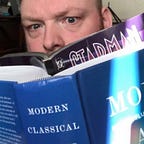Escaping the ‘Grandfather Paradox’. Quantum Mechanics may provide a solution to the puzzles of time-travel
Time-travel has long been a staple of genre films, novels and television shows serving as everything from a backdrop to teen-comedy hi-jinks in ‘Back to Future’ to thoughtful contemplation in Ray Bradbury’s short story ‘A Sound of Thunder’. Often these tales centre around one particular aspect of time-travel, the possible consequences of a traveller in time changing past events in resulting in a nightmarish scenario playing out upon their return to the future, impacting on their ability to have travelled back to the past at all.
This dilemma, known as the ‘grandfather paradox’ outlines both philosopher’s and physicist’s main objection to time-travel, the possible violation of causality. Whilst time-travel itself remains in the realm of pure speculation, the possible results of the violation of the principle of causality and how nature may prevent them, are hotly debated topics beyond the realms of pulp-fiction with philosophers and physicists such as Stephen Hawking and Kip Thorne speculating on possible solutions. Is it possible that the ‘many-worlds’ interpretation of quantum mechanics can rescue a hapless (and clumsy) time-traveller?
